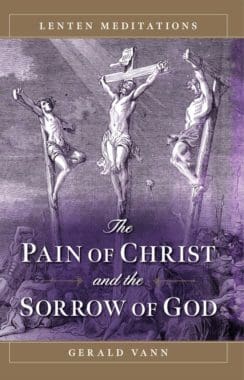Christ was crucified between two thieves. From each of them, let us learn a final lesson. There was one who blasphemed Christ: it is a warning to us that, even though one is very near to Him—as we who, through His mercy, have been brought to know Him and be constantly near Him in His Church—still one may fail to see and to understand; still, at the end, one may be lost. Once before, He had said, “Power has gone out from me” (Luke 8:46, Knox)—power to quicken and heal—and you would have thought that here, above all, as He hung on the Cross, that power would be mighty to heal and renew the soul of a man. Yet the robber blasphemed him; and it reminds us that there can be a state of soul against which Love itself is powerless because it has hardened itself against Love.
Hell is essentially a state of being that we fashion for ourselves: a state of final separateness from God that is the result not of God’s repudiation of man but of man’s repudiation of God, and a repudiation that is eternal precisely because it has become, in itself, immovable. There are analogies in human experience: the hate that is so blind, so dark, that love only makes it the more violent; the pride that is so stony that humility only makes it the more scornful; the inertia—last, but not least, the inertia—that has so taken possession of the personality that no crisis, no appeal, no inducement whatsoever, can stir it into activity but, on the contrary, makes it bury itself the more deeply in its immobility. So with the soul and God: pride can become hardened into Hell, hatred can become hardened into Hell, any of the seven root forms of wrongdoing can harden into Hell, and not least that sloth that is boredom with divine things, the inertia that cannot be troubled to repent, even though it sees the abyss into which the soul is falling, because for so long, in little ways perhaps, it has accustomed itself to refuse whatever might cost it an effort. May God in His mercy save us from that.
But there is the other robber; and from the glory revealed in this apparently unlikely material, there is much that we can learn.
And first the lesson of great comfort. You remember our Lord’s words to St. Peter about the forgiveness of sin: “Not seven times, but seventy times seven times” (see Matt. 18:22). It is never too late. You remember the man who had been on his back for thirty-eight years and then, in the end, received the healing touch of Christ (John 5:2ff.). It is never too late. And if we have to look back on a long series of failures, if it seems, looking back, that all the attempts we have made to serve God fully have always dwindled away into nothing almost as soon as they were begun, still it is never too late to start again. We never exhaust the infinity of the patience of Love.
But this is a case unparalleled in the life of our Lord. He does not just tell the thief that he shall have the Kingdom. “This day shalt thou be with me in paradise” (Luke 23:43, DR). Do you think of this as some special, and specially dramatic, form of God’s mercy: so near the end of His own agony, He ignores the claims of divine justice, He wipes away with a word the evildoing of years, and makes a gift of unique prodigality, quite outside the ordinary economy of providence? No, Heaven, too, is essentially a state of being, a state of perfect oneness with God, no more arbitrary than Hell. If the robber is to be at once with Christ in Paradise, it is because he will be immediately ready; he will have achieved the perfection of love. It will be because God will say of him what He said of Magdalen: Many sins are forgiven him, are turned into glory, because he has loved much (see Luke 7:47).
Let us note immediately how much that fact, too, is a comfort and an encouragement for us, so conscious of the burden of sin that weighs us down. At the end, it is said, we shall be judged on love. You cannot, of course, say, “Then I need not bother about sins: it will be all right as long as I love God.” Our Lord told us: “If you love me, keep my commandments” (John 14:15, DR). The more you love God, the harder you will try not to sin. If you try not at all, it means that you love not at all. But the trying is all. We are never to be depressed and hopeless about past failures; we are meant to make them the material of a deeper love. We are never to worry in a self-centered way about our sinfulness; we are to keep our eyes on the Lord, trying to love Him better. Christianity is not a negative thing, not just the avoidance of things that are wrong. Christianity is love; and love, if it is deep enough and strong enough, will always cover a multitude of sins.
+
This article is adapted from a chapter in The Pain of Christ and the Sorrow of God by Fr. Gerald Vann which is available from Sophia Institute Press.
Art for this post on the Passion: Cover and featured image used with permission.





